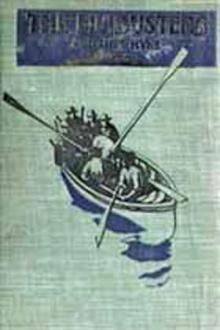The Filibusters - Charles John Cutcliffe Hyne (best english books to read for beginners .TXT) 📗

- Author: Charles John Cutcliffe Hyne
- Performer: -
Book online «The Filibusters - Charles John Cutcliffe Hyne (best english books to read for beginners .TXT) 📗». Author Charles John Cutcliffe Hyne
“You see, gentlemen, I do not aspire to making a resting-place for weaklings. There will be no premium in Sacaronduca for incapacity; you must either work, and work well, or go under. I have no desire to offer the country as a common dump for all the pauper debris which other States want to be rid of. My idea is to establish a republic for strong men only, whose instincts are clean and healthy; for men with money, men with brains, and men with sinews; who intend to use what God has given them to the full of their power.
“From a moral point of view this may be wrong. A Socialist (I make no doubt) would call the scheme most hideously wicked. Well, an innovator must always brave a tornado of outside opinion; and if I gain the approval of the men I work for, the rest of the world may yap and howl to its heart’s content. I have spent my life in studying this Earth’s ruling machines, and I have pondered very deeply over the needs of Sacaronduca, and it seems to me that a Government built on a vulgar business footing gives the country a superlative chance. The natural resources are enormous. There are mines of gold, silver, platinum, and most of the baser metals. From the geological formation there should be diamonds. The forests are full of valuable timber. The soil, from an agricultural point of view, is the most fertile on earth. Excepting for a narrow fringe on the Pacific coast, the climate is entirely healthy. In fact, the possibilities of the country are unbounded. Yet look at what has been done for it. The Indians were barbarians; the invaders, barbarians merely of a different manner. They have done nothing, any of them. The beautiful land, with its latent power, is a mere pig’s wallow of barbarism still. There are no railways, there is scarcely a road. Excepting for the port of Los Angeles, Dolores, which calls itself the capital, is the only town worthy of the name; and it is merely a glorified gambling-hell, with a bull-fight on Sundays, and eight assassinations to the average week. The other towns are cheery robber villages, garnished with squalid children, and marked out with a halo of empty salmon tins.
“To reconstruct such a country by setting up any of the stereotyped kinds of rule would be the worst kind of foolishness. We should cause the usual revolutionary deluge of blood, and if we did upset the present governors, we ourselves would most surely be dethroned in turn when the novelty of our occupation wore away. But, gentlemen, if we institute a government of common-sense”
“Tempered with Martini bullets,” Coffin put in.
“Certainly: a government which can use the heavy hand when needful; and if at the same time we import British energy, and British regard for advancement; why, then, gentlemen, I am convinced that we shall make Sacaronduca arise as the most brilliant star of many eras. I can see the country,” the General went on, with a lighting face, ” I can see the country under those new conditions bursting joyously like a child into a new and brilliant life. I can see roads cut, railways winding through the forests, pack trains carrying the wealth of mines to the sea. I can see new towns, built of comely houses, with boulevarded streets, and music in the plazas; new picture-galleries and operahouses; and above all a new peace and industry that was never known in Sacaronduca before. I can hear, too (in imagination), the rustle of movement and action coming up from every acre within the country’s marches; and I can see (perhaps with a wicked pride), the envy of our neighbours of San Salvador, Nicaragua, Honduras, and Costa Rica. But they must confine themselves to envy. They shall not compel Sacaronduca to tax herself in order that she may maintain a standing army. We shall be slow to anger; but let them beware how they transgress beyond a fixed limit. Once they force me into war, I shall not spare my hand. I shall not conquer merely; I shall crush out of existence.”
The General ceased speaking, and for some minutes no one put in a word. Each, in our own proper way, we, too, were much wrapped up in the fate of Sacaronduca; and what we had been told opened up a good many vistas. We knew that Briggs, suave though he might be with individuals, would never swerve an inch when he had once set down his course to any great matter. It did not require a very long acquaintance with the man to be satisfied over this. The stranger in the street could have read it in one casual glance at the clean-shaven face of him; a mobile face, that in some aspects was grim almost to cruelty, though softening wonderfully under gentler influences, and at times flashing with a delicious kindliness, but always essentially the face of a strong man.
He was going to juggle with the issues of life and death; we were to be on the stage with him, as confederates and assistants, knowing exactly what was expected of us; and now or never was the time to say if we wished to withdraw. Afterwards it would be too late. We were to sign ourselves into his service body and soul, without option of release, and we offered our heads in pledge for our words. He was at liberty any minute to shoot any one of us who in any degree whatever failed to do his bidding.
It was Carew who ended the silence. He suddenly looked at his watch, frowned, and stood up.
“By Jove! Two o’clock. Look here, I’ve got to be at Victoria by the three-thirty if I’m to catch the Brindisi boat train, and I have to go to the bank for money and do nine other things first. It will be ten days before there’s another Australian boat, so I mustn’t miss this. Your promises of loot might be clearer, but as it is I guess I must look after myself. Hand over the contract, General, if you don’t mind, and let me make my mark, and then I’ll be off.” He scribbled his name at the foot of a document, and threw the pen on the table-cloth. ” There you are, General. All’s fair in war, as you say, so I’m signing myself on without a blush as yours hilt and blade, just for what I can get out of it in solid plunder. It’s distinctly understood that I come for no higher motive. And now good-bye. I know my job by heart. I’ll scare up fifty neck-or-nothing Australians and make them toe the mark at your rendezvous by the right time. Ta ta, you fellows, and don’t bring out any fancy small-bore revolvers. Four-fifty’s the best by miles. That’s a reliable fact.”
He walked across the room, nodded again, and passed through the door. Coffin got up as he left.
“Well, if that’s all, General, I’ll just sign on and take myself off. I’ve a match to shoot at Hurlingham this afternoon, which ought to bring me in a couple of hundred if the pigeons fly anything like kind. My boat sails from Southampton at some unearthly hour like eleven tomorrow morning, so I’ll be rustling up Mr. Rhodes’s young men at the Cape within a fortnight, and I don’t think I’ll have much trouble in bringing up my eighty. Good-bye all. I will be round at the club by twelve to-night if anyone wants a turn at poker.”
He, too, signed the agreement and left the room, and then Fluellen and Davis followed his example, the one to take passage for and beat up recruits in British Columbia, the other to start about his task of collecting the armament in Britain and Europe, and getting hold of the other munitions of war.
The General and I were alone, and when the door shut for the last time, we leaned back in our chairs with a simultaneous stretching of the arms and treated ourselves to sighs of relief. Each noticed the other’s movement, and each smiled, though rather wearily. We had gone through a good deal to bring about the little scene which had just been completed.
“It’s been an anxious time, hasn’t it, Birch, up to now?”
“It has, General,” said I, ” and for relief we shall have a spell during the next five months which will make us ten times as anxious. If any of those four men who have just gone out let slip a word too much the news will travel, and we shall have not only Sacaronduca but ten other governments on the lookout for us. And, moreover, the British, with the memory of the Alabama case still biting on them, will lay an embargo on any vessel we try to get a clearance for, and will flaunt the Foreign Enlistment Act in the ears of all their dutiful subjects. They may very conveniently wreck us yet.”
“They may contrive to upset many links of the scheme as it is mapped out at present, my dear Birch, but you pay me a very poor compliment if you suppose I haven’t got a relay of others up my sleeve. However, we will tackle those when the time comes. For the present I have another little worry to occupy me. You saw Louis hand me in that letter just now? It was from Sacaronduca, and from what it told me I have grave doubts as to the advisability of taking Fluellen as one of my officers.”
I stared. I did not understand, and said so.
“You know Fluellen’s object in joining us at all?”
“Vaguely. He’s got into some trouble over a woman, hasn’t he?”
“That is a bald way of putting it,” said the General, ” and perhaps hardly does justice to the man. He is more sinned against than anything else, and his good qualities are acting as a curse against him. He was engaged to an Irish girl called Julia Armitage, whom he had known half his life. He is not a man of small ideas, but in the matter of liking he concentrated himself. He was devoted to this girl, and when he lost her (by her marriage to another man) he got a knock which he does not seem able to rise up from. This happened now four years ago, and most men would by this time have consoled themselves in another way. But Fluellen seems to be one of those inconvenient people who cannot forget, and the dull, hopeless longing for this woman has given life for him such an ache that he is pretty tired of it. I met him (as you will recollect) in a house in Scotland, and took his measure, and thought that he would serve my purpose. So I went with him out for a walk one morning and sounded him cautiously. There was no mistake; so soon as he grasped what I was proposing he leaped like a despairing man at the chance of joining us. ‘ My God,’ he said, ‘ give me the opening for excitement, for quick, anxious movement which will make me forget things, and I will thank you as few men have been thanked before. And I’ll





Comments (0)